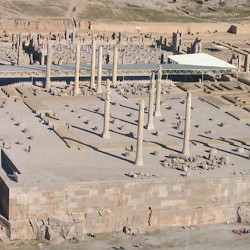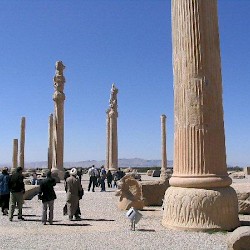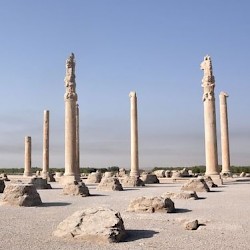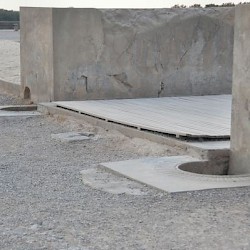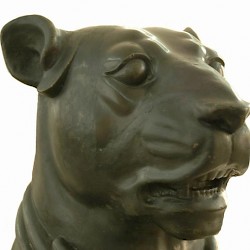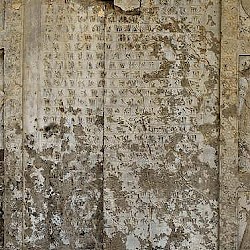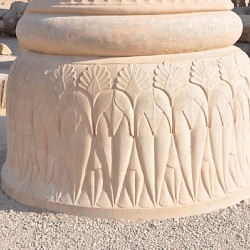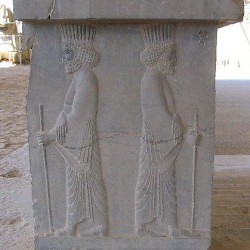Persepolis, Apadana
Q617256Persepolis (Old Persian Pârsa, modern Takht-e Jamshid): Greek name of one of the capitals of the ancient Achaemenid Empire, founded by king Darius the Great (r.522-486 BCE). There were several satellite sites, Naqš-e Rustam and Takht-e Rustam.
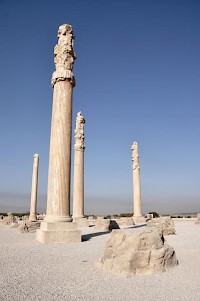
The Apadana or Audience Hall of Persepolis (map 1) belongs to the oldest building phase of the palace complex, the grand design by it founder, king Darius I the Great (r. 522-486). In this large hall, the great king received the tributes from all the subjects in the Achaemenid Empire, and gave presents in return.
One of the arguments to assume that this was indeed the function of the Apadana, is the splendid relief on the eastern stairs, which consists of representations of all nations in the empire. It was clearly important, because the same relief was repeated on the northern stairs when the main entrance was moved from the east to the north. When people came to pay tribute, they saw on the stairs representations of themselves.
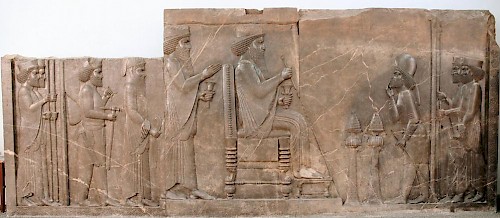
Perhaps, this festival was celebrated at the beginning of spring, when the Iranian nations celebrate the new year, "Now Ruz", even today. Although this theory is certainly attractive, and although the celebration of a gift exchange festival in the Apadana is very likely, there is no hard evidence for the date of its celebration.
A relief that once was the center part of the northern stairs, shows king Darius on his throne, crown prince Xerxes behind him, two incense burners, and an important official, probably Pharnaces. He salutes the king, and announces the arrival of the tribute carriers, who are also represented on the wall near the stairs.

The gift exchange mechanism was one of the central elements in the Persian royal ideology, and the Apadana was, therefore, one of the most important symbols of the great king's power. It is no coincidence that Alexander the Great, in 330 BCE, selected the Apadana and the Treasury (where the presents were stored) to be destroyed, together with the Palace of Xerxes. On some column bases, you can still see the black traces of burning.
The Hall, the largest and probably most beautiful of the buildings at Persepolis, could accommodate hundreds of people. The seventy-two columns which supported the roof (6x6 inside the hall, the remainder in three porticoes) were twenty-five meters high.
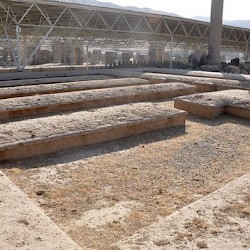 Persepolis, Apadana, Corner |
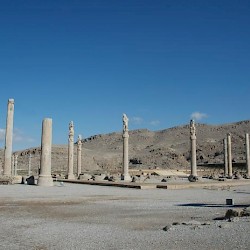 Persepolis, Apadana from the south |
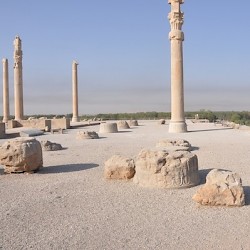 Persepolis, Apadana, Northern Portico |
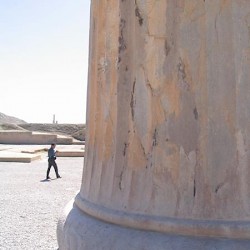 Persepolis, Apadana, Column, Traces of fire |
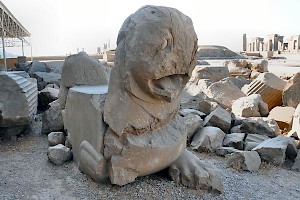
Today, only thirteen columns are standing, but in the sixteenth century, there were forty. Back then, the ruin was called Tchilminar, "forty columns". In 1704, Cornelis de Bruijn, the first professional artist to visit the site and make drawings for scholars, saw that the columns were used by storks to build their nests upon.
On top of the columns were capitals, consisting of two heads of strong animals like bulls or lions. Between the two heads was the place where the wooden beams could rest. (An ancient representation of these capitals, cut in a rock, can be seen here.)
The roof of the Apadana had been made of precious kinds of wood. When the site was excavated, the archaeologists discovered a layer of 30 to 60 centimeters of burnt cedar, ebony, and teak wood.
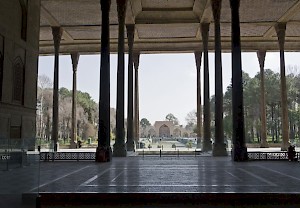
A comparison to a Safavid palace (the Chehel Sotun in Isfahan), may be helpful. The Apadana of Persepolis had a similar roof, although the columns were made of stone. In fact, this type of building is much older than Persepolis: we may think of Median sites like Godin Tepe and Tepe Nush-e Jan and Cyrus' audience hall, Palace S in Pasargadae.
There were several Achaemenid Royal inscription in the Apadana. In a small box, two silver and two golden plates were discovered with an identical inscription, which is now known as DPh. The text contains a/o the statement that Ahuramazda gave Darius a kingdom "from the Sacae who are beyond Sogdia to Kush, and from Sind to Lydia".
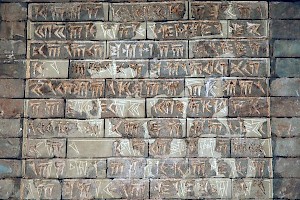
Another inscription from the Apadana was written on glazed bricks, and is known as XPg:
The great king Xerxes says: By the grace of Ahuramazda, much that had been ordered by king Darius, my father, was well. It was also by the grace of Ahuramazda that I completed these works and made it excellent. May Ahuramazda and the gods protect me and my kingdom!
